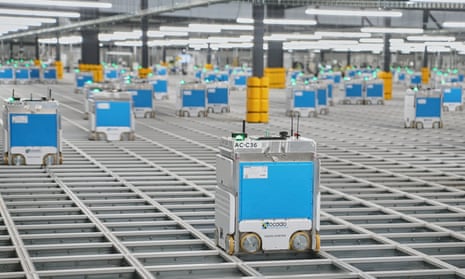Ocado is aiming to raise £575m from investors to fund the expansion of its technology arm, which enables overseas retailers to sell groceries online. It has also agreed a new £300m credit facility with a syndicate of international banks.
Ocado said it wanted the cash to “invest in innovation at a faster pace” and help its clients, which include the US supermarket chain Kroger and the French grocer Casino, to accelerate the shift to online shopping.
The online delivery specialist’s plan was announced late on Monday but came as Fitch downgraded its credit rating to negative from stable. The ratings agency said it would take longer than expected for Ocado’s business building hi-tech warehouses for overseas retailers to become profitable.
“Our rating reflects the growing scale, upfront investments and execution risks associated with the progress on 40 of its international [distribution centres] over the next four years,” Fitch said in a note.
Fitch said the pressure on profits would be temporary, but short-term profit margins would take a hit from customers spending less per order amid the increasing cost of living and higher labour, marketing and energy costs.
Clive Black, a retail analyst at Shore Capital, said Ocado needed to raise cash as it was funding “huge research and development, enormous operating costs and capital expenditure, and it doesn’t generate the money to cover this experiment”.
He said: “It’s symptomatic of an interesting business that doesn’t make enough money to cover its project.”
Ocado’s share price has more than halved in the past year to 831p, amid concerns that it failed to capitalise on the shift to online shopping during the pandemic when trading at supermarkets and high street stores was restricted around the globe.
The company’s hi-tech warehouses struggled to adapt to the rapidly changing retail landscape in the UK over the past two and a half years, while the major supermarkets Tesco, Sainsbury’s, Morrisons and Waitrose all quickly ramped up deliveries via their stores or partnerships with companies such as Deliveroo.
In May this year, Ocado warned that its sales growth would be less than half the rate it had hoped for as the cost-of-living crisis and return to office work and dining out hit trade.
The online grocer, which is partly owned by Marks & Spencer, said it now expected growth of less than 5% for the year to the end of November compared with 10% anticipated.
The forecast came after sales fell 8% in the two months to 25 April compared with a 5.7% decrease in the previous three months. Shoppers have been buying fewer items than usual.









